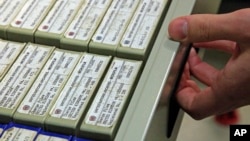Holocaust denial just got a little harder.
The Wiener Library for the Study of Holocaust & Genocide is making the United Nations’ files on World War II war crimes more accessible by allowing the general public to search an online catalog of the documents for the first time beginning Friday. People will still have to visit the library in London or the U.S. Holocaust Museum to read the actual files.
The move is expected to increase interest in the archives of the United Nations War Crimes Commission, including the names of about 37,000 people identified as war criminals and security suspects. The commission operated in 1943-1949, but access to its records was restricted for political reasons in the early days of the Cold War.
Blow to Holocaust denial
“This is a whole hardware store of nails to hammer into the coffin of Holocaust denial,” said Dan Plesch, director of the Center for International Studies and Diplomacy at SOAS University of London. “It’s the first time it is practically accessible to the general public as the commission initially intended.”
Plesch and other researchers campaigned for the U.N. to open access to the files, which he used to write the book “Human Rights After Hitler.” In 2014, the U.S. Holocaust Museum made the archive freely available at its reading room in Washington. Before that, the records had been largely locked away at the United Nations, which granted only limited access.
“Nobody has paid any attention to it,” said Ben Barkow, director of the Wiener Library. “It has been hidden in plain sight.”
War criminal prosecution
The documents detail Allied efforts to prosecute thousands of alleged Nazi and Japanese war criminals, from heads of state like Adolf Hitler to guards at the Auschwitz and Treblinka concentration camps.
The archive includes evidence gathered by local people who documented crimes long before the war ended and smuggled the information to Allied leaders in London.
“These people were meeting under aerial bombardment, dealing with affidavits smuggled out” of occupied countries, Plesch said. “Resistance movements were paying attention to the legal prosecution of oppressors.”




